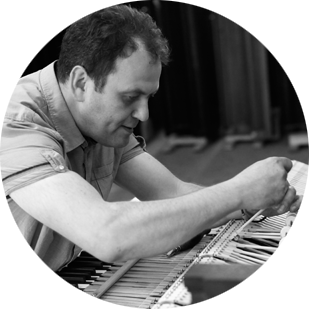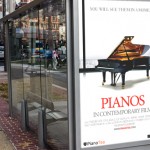 Marian Krawczyk is a concert piano technician. He completed many prestigious trainings and courses i.e Steinway Academy, B. Seminar and Yamaha Academy.
Marian Krawczyk is a concert piano technician. He completed many prestigious trainings and courses i.e Steinway Academy, B. Seminar and Yamaha Academy.
He was a student of Kawai and Bechstian best technicians. He has begun his education in „Piano construction Academy” in Kalisz, and continue it in Wrocław Music Academy.He has been working for over 20 years. His experience and professionalism is well recognised amongst the most famous pianists in the world.
Is it true that, voicing is a part of your job, that you like the most as a piano tuner?
Yes. This is something I discovered by accident and it turned out to be my specialty and a hobby as well.
What is voicing ?
You could say that,
Voicing is a process of finding the most beautiful and clear sound.
Can you compare it to something else??
Voicing for a piano is like a make-up for a woman. You can have a tanned skin, nice dress but a good make-up is what completes a woman beauty.We tunned a piano, regulated the mechanizm and restrung the instrument, but it still doesn’t sound right. That’s because we need to find and extract beautiful sound that we are looking for.
What’s a difference between standard voicing and concert voicing?
Standard intonation is completed at early stage of producing a piano and it should satisfy general populations of future piano adepts.
Concert voicing is specifically designed for a pianist and a concert hall and it should fulfill individual needs of different piano player.
What we can gain thanks to good voicing?
For me, voicing should be based on 3 pillars.
Number 1 – subtle pianissimo- it allows you to play quietly. It’s like a delicate whisper that you can barely hear. Sound shouldn’ t attack listeners with a sharp and metalic tone. As I said it has to be like a delicate whisper.
Number 2 – finding „warmest” sound in „mezzoforte”.
Number 3 it’s great fortissimo, with a „kick”. I am talking about loud and aggressive sound. If you can find this 3 things in grand piano, that is what I call a good voicing.
What could goes wrong during voicing?
Most common mistakes for tuners is when they made it sound too soft and warm, in the result it’s too quiet. The other extreme is to made it sound, too sharp and loud. You can play ‘forte’ well, but won’t find that soft and subtle sound.
Why should one order voicing?
Whether you buy or renovate a grand piano, such as Steinway, Bechstein or Bosendorfer it will cost you a lot of money. But without voicing the instrument isn’t finished. You can compare it to a beautiful and expensive painting without a frame. It just doesn’t look right. It’s the same with a piano. Renovation isn’t completed until an instrument is propaly voiced. So if the voicing is good, no matter who is palying, everybody will enjoy it. The piano will inspire you.
Would you intonate a low budget upright piano?
Absolutely. Every instrument should be voiced.
Why?
A very good pianist, once told me, that if a piano is properly voiced, it inspires him. On the other hand, when it’s not, he has to put a lot of effort to cover it. Instead of focusing on playing the piano, he is struggling with all imperfections.
That’s the idea behind a good voicing… to be inspired. Pianist and his instrument should cooperate together.
I’ve heard many times that pianists were positively surprised, how good the voicing was. They’ve told me later, they really enjoyed playing and the longer they’ ve played the more fun they’ve had.
Those are the moments when I get reward and satisfaction for my work. It’s not only a well tuned instrument but also inspiration for others.





